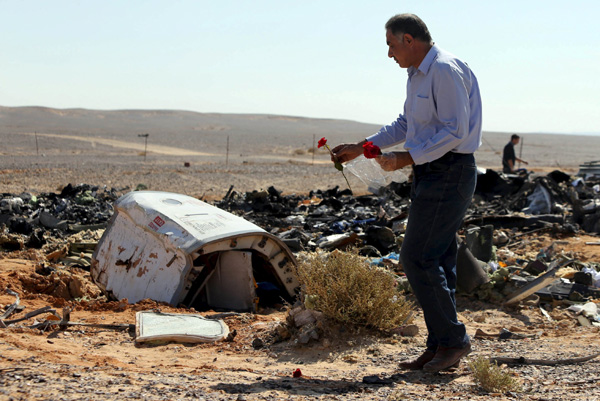|
 |
|
An Egyptian man puts flowers near debris at the crash site of a Russian airliner in al-Hasanah area at El Arish city, north Egypt, November 1, 2015. [Photo/Agencies] |
Islamic State websites have in the past claimed responsibility for actions that have not been conclusively attributed to them. Officials say there is no evidence to suggest so far that a bomb could have brought down the plane.
Three carriers based in the United Arab Emirates airlines - Emirates, Air Arabia and flydubai - said on Sunday they were re-routing flights to avoid flying over Sinai. Two of Europe's largest carriers, Lufthansa and Air France-KLM, have already said they would avoid flying over peninsula while awaiting an explanation of the cause.
Sherif Fathy, Chairman of EgyptAir, said the national carrier had taken no such action. "I heard some other companies may be doing this, but I don't think it's justified," he said.
The A321 is a medium-haul jet in service since 1994, with over 1,100 in operation worldwide and a good safety record. It is a highly automated aircraft relying on computers to help pilots stay within safe flying limits.
Airbus said the A321 was built in 1997 and had been operated by Metrojet since 2012. It had flown 56,000hours in nearly 21,000 flights.
The aircraft took off at 5:51 a.m. Cairo time (0351 GMT) and disappeared from radar screens 23 minutes later, Egypt's Civil Aviation Ministry said in a statement. It was at an altitude of 31,000 feet (9,400 metres) when it vanished from radar screens.
According to FlightRadar24, an authoritative Sweden-based flight tracking service, the aircraft was descending rapidly at about 6,000 feet (1,800 metres) per minute when the signal was lost to air traffic control.